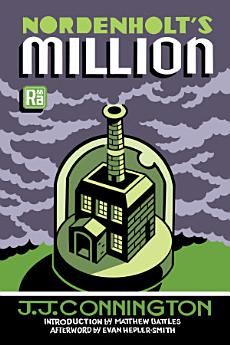Nordenholt's Million
Aug 2022 · MIT Press
Ebook
394
Pages
family_home
Eligible
info
reportRatings and reviews aren’t verified Learn More
About this ebook
As a bacteria threatens to wipe out humankind, a plutocrat sets himself up as the benignant dictator of a survivalist colony.
In this novel originally published in 1923, as denitrifying bacteria inimical to plant growth spreads around the world, toppling civilizations and threatening to wipe out humankind, the British plutocrat Nordenholt sets himself up as the benignant dictator of a ruthlessly efficient, entirely undemocratic, survivalist colony established in Scotland’s Clyde Valley. Discovering just how far their employer is willing to go in his effort to spare one million lives, Jack Flint, the colony’s director of operations, and Elsa Huntingtower, Nordenholt’s personal assistant, are forced to grapple with the question of whether a noble end justifies dastardly means.
In this novel originally published in 1923, as denitrifying bacteria inimical to plant growth spreads around the world, toppling civilizations and threatening to wipe out humankind, the British plutocrat Nordenholt sets himself up as the benignant dictator of a ruthlessly efficient, entirely undemocratic, survivalist colony established in Scotland’s Clyde Valley. Discovering just how far their employer is willing to go in his effort to spare one million lives, Jack Flint, the colony’s director of operations, and Elsa Huntingtower, Nordenholt’s personal assistant, are forced to grapple with the question of whether a noble end justifies dastardly means.
About the author
Under the pseudonym J. J. Connington, Alfred Walter Stewart (1880–1947) wrote seventeen well-received detective novels; Nordenholt’s Million is his only science fiction novel. Stewart was a distinguished British chemist and author of the popular textbooks Recent Advances in Organic Chemistry (1908) and Recent Advances in Physical and Inorganic Chemistry (1909). Via a 1918 theory of the physical chemistry of radioactivity, he contributed the term isobar—as complementary to the term isotope—to science.
Matthew Battles is the author of Library: An Unquiet History, Palimpsest, and Tree, as well as the story collection The Sovereignties of Invention. His writing on the cultural dimensions of science, technology, and the natural world have appeared in the Atlantic, the Boston Globe, and Orion. For Harvard's metaLAB, he develops research into the dark abundance of collections, cultural and technology, and conditions of experience in the context of deep time.
Evan Hepler-Smith teaches the history of science and technology and environmental history at Duke University. He has a special interest in the history of chemicals and chemistry, information technology, and environmental regulation. His book in progress is entitled Compound Words: Chemical Information and the Molecular World. His writing has been published in the New York Times, the Wall Street Journal, Time.com, and Public Books.
Matthew Battles is the author of Library: An Unquiet History, Palimpsest, and Tree, as well as the story collection The Sovereignties of Invention. His writing on the cultural dimensions of science, technology, and the natural world have appeared in the Atlantic, the Boston Globe, and Orion. For Harvard's metaLAB, he develops research into the dark abundance of collections, cultural and technology, and conditions of experience in the context of deep time.
Evan Hepler-Smith teaches the history of science and technology and environmental history at Duke University. He has a special interest in the history of chemicals and chemistry, information technology, and environmental regulation. His book in progress is entitled Compound Words: Chemical Information and the Molecular World. His writing has been published in the New York Times, the Wall Street Journal, Time.com, and Public Books.
Rate this ebook
Tell us what you think.
Reading information
Smartphones and tablets
Install the Google Play Books app for Android and iPad/iPhone. It syncs automatically with your account and allows you to read online or offline wherever you are.
Laptops and computers
You can listen to audiobooks purchased on Google Play using your computer's web browser.
eReaders and other devices
To read on e-ink devices like Kobo eReaders, you'll need to download a file and transfer it to your device. Follow the detailed Help Center instructions to transfer the files to supported eReaders.








